【英语】吉林省毓文中学2015-2016学年高二下学期第一次月考试题
- 格式:doc
- 大小:38.83 KB
- 文档页数:14
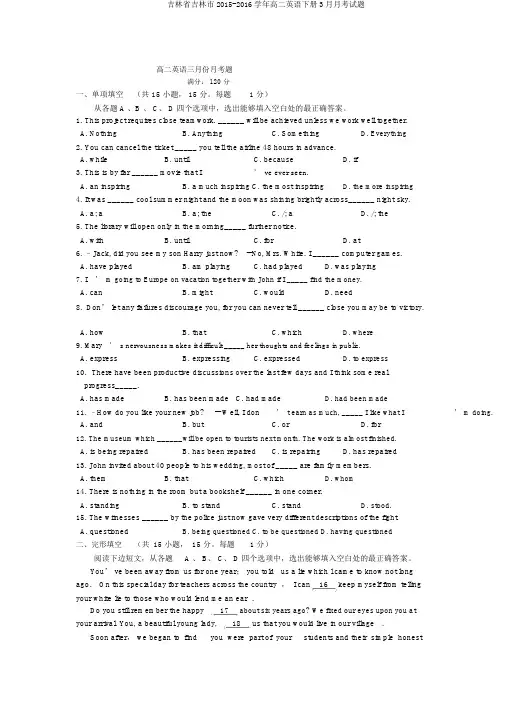
高二英语三月份月考题满分: 120 分一、单项填空(共 15 小题, 15 分。
每题 1 分)从各题 A 、B 、 C、 D 四个选项中,选出能够填入空白处的最正确答案。
1. This project requires close teamwork. ______ will be achieved unless we work well together.A. NothingB. AnythingC. SomethingD. Everything2. You can cancel the ticket _____ you tell the airline 48 hours in advance.A. whileB. untilC. becauseD. if3. This is by far ______ movie that I’ ve ever seen.A. an inspiringB. a much inspiringC. the most inspiringD. the more inspiring4. It was ______ cool summer night and the moon was shining brightly across______ night sky.A. a; aB. a; theC. /; aD. /; the5. The library will open only in the morning_____ further notice.A. withB. untilC. forD. at6. –Jack, did you see my son Harry just now? --No, Mrs. White. I ______ computer games.A. have playedB. am playingC. had playedD. was playing7. I’ m going to Europe on vacation together with John if I _____ find the money.A. canB. mightC. wouldD. need8.Don’ let any failures discourage you, for you can never tell ______ close you may be to victory.A. howB. thatC. whichD. where9. Mary’ s nervousness makes it difficult _____ her thoughts and feelings in public.A. expressB. expressingC. expressedD. to express10.There have been productive discussions over the last few days and I think some realprogress_____.A. has madeB. has been madeC. had madeD. had been made11. –How do you like your new job?-- Well, I don’ t earn as much, _____ I like what I’ m doing.A. andB. butC. orD. for12. The museum which ______will be open to tourists next month. The work is almost finished.A. is being repairedB. has been repairedC. is repairingD. has repaired13. John invited about 40 people to his wedding, most of _____ are family members.A. themB. thatC. whichD. whom14. There is nothing in the room but a bookshelf ______ in one corner.A. standingB. to standC. standD. stood.15. The witnesses ______ by the police just now gave very different descriptions of the fight.A. questionedB. being questionedC. to be questionedD. having questioned二、完形填空(共15 小题,15 分。
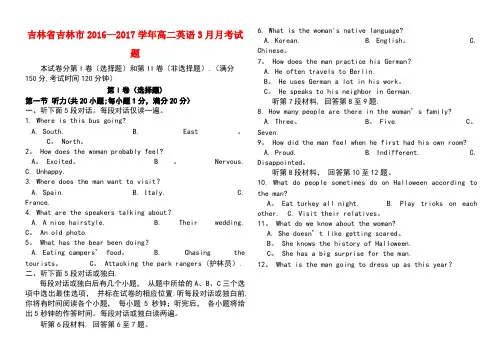
吉林省吉林市2016—2017学年高二英语3月月考试题本试卷分第I 卷(选择题)和第II 卷(非选择题).(满分150分,考试时间120分钟) 第I 卷(选择题) 第一节 听力(共20小题;每小题1分,满分20分) 一、听下面5段对话。
每段对话仅读一遍。
1. Where is this bus going? A. South. B. East 。
C 。
North 。
2。
How does the woman probably feel? A 。
Excited 。
B 。
Nervous. C. Unhappy. 3. Where does the man want to visit ? A. Spain. B. Italy. C. France. 4. What are the speakers talking about ? A. A nice hairstyle. B. Their wedding. C 。
An old photo. 5。
What has the bear been doing ? A. Eating campers ’ food 。
B. Chasing the tourists 。
C 。
Attacking the park rangers (护林员). 二、听下面5段对话或独白.每段对话或独白后有几个小题, 从题中所给的A 、B 、C 三个选项中选出最佳选项, 并标在试卷的相应位置.听每段对话或独白前, 你将有时间阅读各个小题, 每小题5秒钟;听完后, 各小题将给出5秒钟的作答时间。
每段对话或独白读两遍。
听第6段材料, 回答第6至7题。
6. What is the woman's native language?A. Korean.B. English 。
C. Chinese 。
7。
How does the man practice his German ?A. He often travels to Berlin. B 。
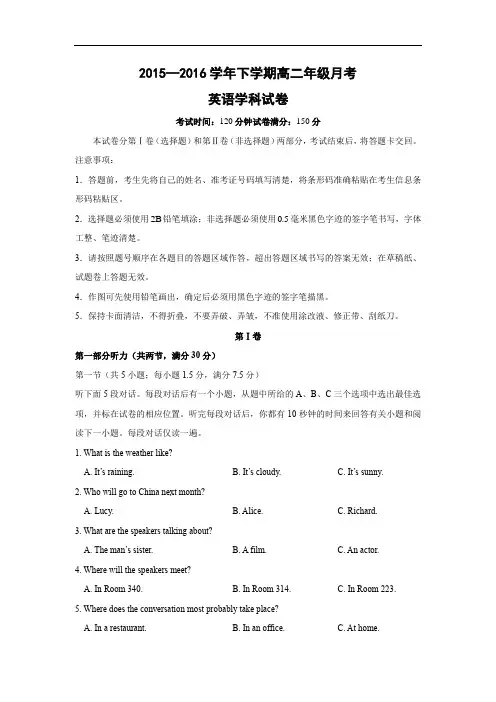
2015—2016学年下学期高二年级月考英语学科试卷考试时间:120分钟试卷满分:150分本试卷分第Ⅰ卷(选择题)和第Ⅱ卷(非选择题)两部分,考试结束后,将答题卡交回。
注意事项:1.答题前,考生先将自己的姓名、准考证号码填写清楚,将条形码准确粘贴在考生信息条形码粘贴区。
2.选择题必须使用2B铅笔填涂;非选择题必须使用0.5毫米黑色字迹的签字笔书写,字体工整、笔迹清楚。
3.请按照题号顺序在各题目的答题区域作答,超出答题区域书写的答案无效;在草稿纸、试题卷上答题无效。
4.作图可先使用铅笔画出,确定后必须用黑色字迹的签字笔描黑。
5.保持卡面清洁,不得折叠,不要弄破、弄皱,不准使用涂改液、修正带、刮纸刀。
第Ⅰ卷第一部分听力(共两节,满分30分)第一节(共5小题;每小题1.5分,满分7.5分)听下面5段对话。
每段对话后有一个小题,从题中所给的A、B、C三个选项中选出最佳选项,并标在试卷的相应位置。
听完每段对话后,你都有10秒钟的时间来回答有关小题和阅读下一小题。
每段对话仅读一遍。
1. What is the weather like?A. It’s raining.B. It’s cloudy.C. It’s sunny.2. Who will go to China next month?A. Lucy.B. Alice.C. Richard.3. What are the speakers talking about?A. The man’s sister.B. A film.C. An actor.4. Where will the speakers meet?A. In Room 340.B. In Room 314.C. In Room 223.5. Where does the conversation most probably take place?A. In a restaurant.B. In an office.C. At home.第二节(共15小题;每小题1.5分,满分22.5分)听下面5段对话或独白。
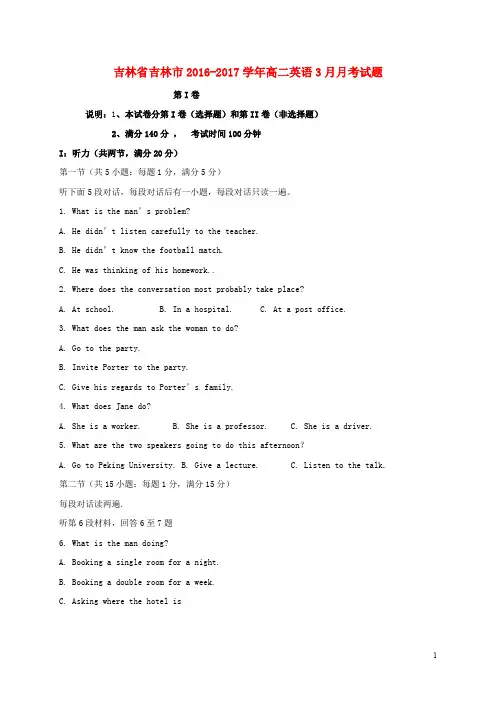
吉林省吉林市2016-2017学年高二英语3月月考试题第I卷说明:1、本试卷分第I卷(选择题)和第II卷(非选择题)2、满分140分,考试时间100分钟I:听力(共两节,满分20分)第一节(共5小题:每题1分,满分5分)听下面5段对话,每段对话后有一小题,每段对话只读一遍。
1. What is the man’s problem?A. He didn’t listen carefull y to the teacher.B. He didn’t know the football match.C. He was thinking of his homework..2. Where does the conversation most probably take place?A. At school.B. In a hospital.C. At a post office.3. What does the man ask the woman to do?A. Go to the party.B. Invite Porter to the party.C. Give his regards to Porter’s family.4. What does Jane do?A. She is a worker.B. She is a professor.C. She is a driver.5. What are the two speakers going to do this afternoon?A. Go to Peking University.B. Give a lecture.C. Listen to the talk. 第二节(共15小题:每题1分,满分15分)每段对话读两遍.听第6段材料,回答6至7题6. What is the man doing?A. Booking a single room for a night.B. Booking a double room for a week.C. Asking where the hotel is7. Which room does the man book?A. Room 401.B. Room 411.C. Room 441.听第7段材料,回答第8至98. What’s the weather like today?A. It is rainy.B. It is cloudy.C. It is sunny.9. What does the woman wish?A. Her friends could come to the party.B. The weather could turn out fine soon.C. The TV program could be interesting.听第8段材料,回答第10至12题10. How many clocks does Peter have?A. Two.B. Three.C. Four.11. How often do the clocks ring in the morning?A. Every ten minutes.B. Every twenty minutes.C. Every thirty minutes.12. Why does Peter need so many clocks?A. Because he wants to get up on time.B. Because he wants to know the right time.C. Because he wants to make his room special.听第9段材料,回答第13至16题。
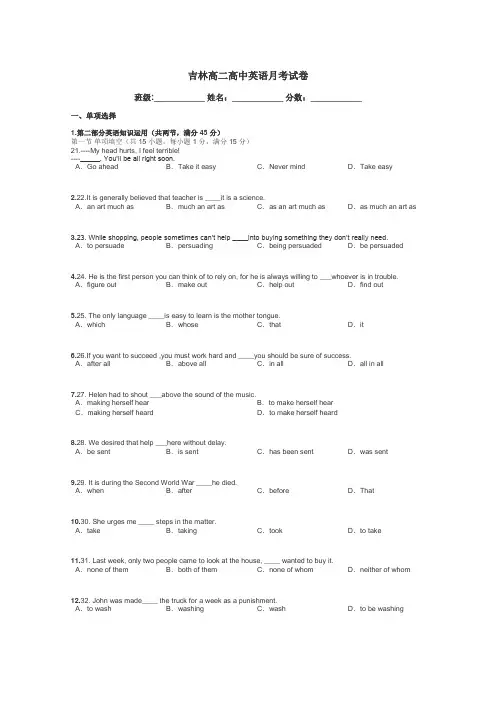
吉林高二高中英语月考试卷班级:___________ 姓名:___________ 分数:___________一、单项选择1.第二部分英语知识运用(共两节,满分 45 分)第一节单项填空(共15 小题,每小题 1 分,满分 15 分)21.----My head hurts, I feel terrible!----_____. You’ll be all right soon.A.Go ahead B.Take it easy C.Never mind D.Take easy2.22.It is generally believed that teacher is ____it is a science.A.an art much as B.much an art as C.as an art much as D.as much an art as 3.23. While shopping, people sometimes can’t help ____into buying something they don’t really need.A.to persuade B.persuading C.being persuaded D.be persuaded 4.24. He is the first person you can think of to rely on, for he is always willing to ___whoever is in trouble. A.figure out B.make out C.help out D.find out5.25. The only language ____is easy to learn is the mother tongue.A.which B.whose C.that D.it6.26.If you want to succeed ,you must work hard and ____you should be sure of success.A.after all B.above all C.in all D.all in all7.27. Helen had to shout ___above the sound of the music.A.making herself hear B.to make herself hearC.making herself heard D.to make herself heard8.28. We desired that help ___here without delay.A.be sent B.is sent C.has been sent D.was sent9.29. It is during the Second World War ____he died.A.when B.after C.before D.That10.30. She urges me ____ steps in the matter.A.take B.taking C.took D.to take11.31. Last week, only two people came to look at the house, ____ wanted to buy it.A.none of them B.both of them C.none of whom D.neither of whom 12.32. John was made____ the truck for a week as a punishment.A.to wash B.washing C.wash D.to be washing13.33. Reading aloud in the morning is _____ to learning a foreign language.A.benefit B.used C.beneficial D.Habit14.34. He quickly adapted himself to ____in the countryside.A.live B.living C.be living D.Lived15.35. This plan is said _____five times.A.to have discussed B.to have been discussedC.having been discussed D.having discussed二、完形填空第二节完形填空 ( 满分30分)In South Korea, a robot made its teaching debut. Children could __36__ take their eyes off a new teacher when the instructor __37__ their classroom. __38__ with intense curiosity by the pupils, __39__ said, “Ho w are you, my students? Let’s get __40__. Have you opened your books?”Although the voice __41__ like human, the teacher was not. It was a robot __42__ Tiro, __43__ was recently invited for one day __44__ a human instructor with __45__ 30-minute English class at Euon Primary School in the central South Korean city of Daejon, 250 kilometres __46__ of Seoul.Tiro asked questions __47__ English such as, “How many giraffes (长颈鹿) __48__ on the board?” It also__49__ the name of the next student to participate in a __50__ task on the screen on its chest.There were a few glitches (失灵) in the experiment, __51__. Tiro, which was connected to a computer, sometimes fell into an__52__ moment of silence when something went wrong with the computer.Still, the Tiro-run cl ass was too short to __53__ the children. “I hope every class will have such a __54__ teacher,” ten-year-old Baek Ji Woong said.The regular teacher was also happy with her new __55__. “I believe that robotic teachers like Tiro are going to be helpful for teachers and students alike,”Jeon Myong Jin said.36. A. hardly B. happily C. only D. merely37. A. comes B. came C. entered into D. entered38. A. Greeting B. Greeted C. Having greeted D. To greet39. A. the teacher B. teacher C. pupil D. the pupil40. A. start B. starting C. started D. beginning41. A. is sounded B. sounding C. sound D. sounded42. A. name B. named C. was named D. was called43. A. which B. who C. when D. where44. A. help B. assist C. to ask D. to assist45. A. a B. an C. the D. /46. A. south B. the south C. in south D. out the south47. A. with B. in C. for D. on48. A. have B. there are C. having D. are there49. A. displays B. displayed C. shows D. shown50. A. role-playing B. roled-playing C. role-play D. role-played51. A. though B. as though C. therefore D. too52. A. embarrass B. embarrassing C. embarrassed D. embarrasses53. A. satisfy B. satisfying C. be satisfied D. be satisfying54. A. robot B. robotic C. robots D. robber55. A. teacher B. student C. pupil D. assistant三、阅读理解1.第三部分阅读理解 (满分30分)ASome scientists say that animals in the ocean are increasingly threatened by noise pollution caused by human beings. It is caused mainly by industrial underwater explosions, ocean drilling, and ship engines.Some scientists have proposed setting a noise limit of one hundred and twenty decibels (分贝) in oceans. They have observed that noises at the level can frighten and confuse (使困惑) whales.A team of American and Canadian scientists discovered that loud noises could seriously injure some animals. They found that powerful underwater explosions were causing whales in the area to lose their hearing. This seriously a ffected the whales’ ability to exchange information and find their way. Some of the whales even died. Some researchers whose work depends on ocean sounds object to (反对) a limit of one hundred and twenty decibels. They say such a limit would mean an end to important industrial and scientific research. Scientists do not know how much and what kinds of noises are harmful to ocean animals. However, many scientists agree that noise is a greater danger than they believed. They want to prevent noises from harming creatures (生物) in the ocean.56. According to the passage, which of the following is increasingly dangerous to sea creatures?A. The man-made noises.B. The noises made by themselves.C. The sound of earthquakes.D. The sound of ice-breaking.57. Concerning the effect of noises on whales, which of the following is TRUE?A. They are deaf to noises.B. Noises at a certain level may hurt them.C. Noises could kill them.D. Noises will cause them to lose their eyesight.58. Some scientists think that the noise limit of one hundred and twenty decibels would _________.A. prevent them doing their research workB. benefit them a lot in their research workC. do good to their healthD. increase the industrial output59. According to the last paragraph, what will scientists most probably do in the future?A. They will study the effect of different noises in the sea.B. They will work hard to make no noise.C. They will never do any scientific research in the sea.D. They will protect sea animals from harmful noises.2.BToday, robots come in all shapes and sizes. They can’t complain, even if the work is heavy and dangerous. And they can work or play all day without getting bored. Unlike a human’s arms, a robot’s joints will never get stiff (僵硬的). The end of the arm can be fitted with devices (装置) to perform different tasks. These could be a welding (焊接) point, suction cups (吸附杯) or gripping fingers (钳形指) for lifting and moving objects. Such an arm of these computer controlled industrial robots can work 24 hours a day.Robopets (机器人宠物) are high-tech robots programmed to play. They can communicate with their owners and recognize their voices. Each one will develop a different “personality”. They can be a lo t of fun to play with, but these robots can also be helpful to people who are sick and can’t look after a real animal. Many doctors believe that when a person is happy and laughing, their body recovers faster. A robopet might be just what the doctor ordered.NeCoRo is a robot cat that has been developed to be more than a toy. The robot uses sensors (传感器) that can detect movement and sound. It can even store helpful information in its memory. Its behaviour changes over time, just like a real pet.60. From Paragraph 1 we learn that ________.A. a human’s arms never get stiffB. robots sometimes get bored just as humans doC. robots can do some work which humans can’tD. robots can work all day but they can’t play61. Rob pets are especially useful in ________according to the passage.A. schoolsB. HospitalsC. cinemasD. factories62. Which of the following is NOT true according to the passage?A. A robot never says “NO” to the dangerous work.B. A robot can “remember” useful information.C. NeCoRo is a robot dog.D. NeCoRo’s behaviour changes over time.63. What does the underlined word “detect” in Paragraph 3 mean?A. Recognize.B. Create.C. Store.D. Destroy.3.CWhat should I eat for breakfast? Who should I go out with on weekends? What should I do if I miss the bus to school? What colleges should I apply for? Again and again Chinese kids ask these questions to their teachers and parents. They can’t make their own choices.Kids in America would be very surprised to hear how much Chinese children depend on adults. When they are ten years old, kids decide what clothes they want to wear and buy. By twelve they know what classes to take formiddle school. Thirteen years old is the beginn ing of being what Americans call a “teenager”. Now the child is up to almost all his / her decisions. Finally at sixteen the kid usually gets a car from his / her parents.Why should kids be independent? Think about it. After high school most of us will be by ourselves. Will our parents be able to tell us what to eat for breakfast in college? Can our teachers decide what we should do at work?Making our own choices can be quite hard and scary. But we can start with making small choices, and then slowly make bigger and more important choices.64. The first paragraph is written to tell the readers that Chinese kids ______.A. don’t know what to doB. always have many questionsC. believe in their teachers and parentsD. depend on adults too much65. At what age can an American kid make most decisions by himself or herself?A. Ten.B. Twelve.C. Thirteen.D. Sixteen.66. Which of the following is NOT true according to the passage?A. American kids are more independent than Chinese kids.B. American kids will more easily adapt themselves to society.C. American parents don’t care for their children.D. A sixteen American youngster can drive his / her own car.67. In the writer’s eyes, ______.A. dependence on adults is shameful in ChinaB. independence from adults is worth encouragingC. kids have no ability to make a real choiceD. making decisions is rather easy4.DI grew up in a small town. I was only ten years old when my dad gave me the responsibility of feeding the chickens and cleaning up the stable (马厩). He believed it was important for me to have those jobs to learn responsibility. Then, when I was 22, I found a job in Natchbill at a country music club called the Natchbill Palace.I washed dishes and cooked from 4:00 pm to 9:00 pm and then went on stage and sang until 2:00 in the morning. It wasn’t long before I became known as a singing cook. I had been rejected so many times by record companies that it was hard not to be discouraged.One night, a woman executive (董事) from a company named Warner Brothers Records came to hear me sing. When the show was over, we sat down and talked and after she left, I said to myself it was one more rejection. A few weeks later, my manager received a phone call — Warner Brothers wanted to sign me to a record deal. Soon after, I had my first record in June 1986. It sold over 2 million copies. My best efforts had gone into every job I’ve ever held. It was the sense of responsibility that made me feel like a man.68. Why was the writer once known as a singing cook?A. He was a cook at a country music club.B. He sang for guests while he worked as a cook.C. He often sang while cooking.D. He liked singing better than cooking.69. Who first recognized the writer’s talents and h elped make him successful?A. His brother.B. His manager.C. His father.D. A businesswoman.70. It can be inferred from the passage that the ______.A. writer’s success is partly due to his fatherB. writer’s family was very poorC. writer succeeded easilyD. writer’s first record was a total failure四、其他第三部分第二节(共5小题;每小题2分,满分10分)根据短文内容,从短文后的选项中选出能填入空白处的最佳选项。
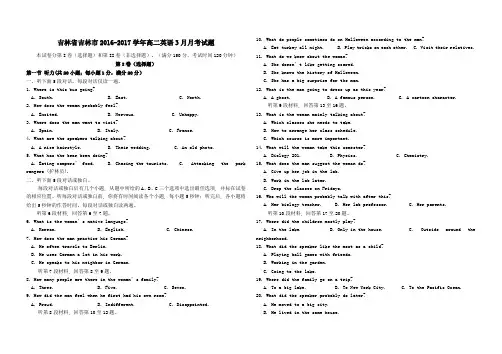
吉林省吉林市2016-2017学年高二英语3月月考试题本试卷分第I卷(选择题)和第II卷(非选择题)。
(满分150分,考试时间120分钟)第I卷(选择题)第一节听力(共20小题;每小题1分,满分20分)一、听下面5段对话。
每段对话仅读一遍。
1. Where is this bus going?A. South.B. East.C. North.2. How does the woman probably feel?A. Excited.B. Nervous.C. Unhappy.3. Where does the man want to visit?A. Spain.B. Italy.C. France.4. What are the speakers talking about?A. A nice hairstyle.B. Their wedding.C. An old photo.5. What has the bear been doing?A. Eating campers’ food.B. Chasing the tourists.C. Attacking the park rangers (护林员).二、听下面5段对话或独白。
每段对话或独白后有几个小题, 从题中所给的A、B、C三个选项中选出最佳选项, 并标在试卷的相应位置。
听每段对话或独白前, 你将有时间阅读各个小题, 每小题5秒钟;听完后, 各小题将给出5秒钟的作答时间。
每段对话或独白读两遍。
听第6段材料, 回答第6至7题。
6. What is the woman’s native language?A. Korean.B. English.C. Chinese.7. How does the man practice his German?A. He often travels to Berlin.B. He uses German a lot in his work.C. He speaks to his neighbor in German.听第7段材料, 回答第8至9题。
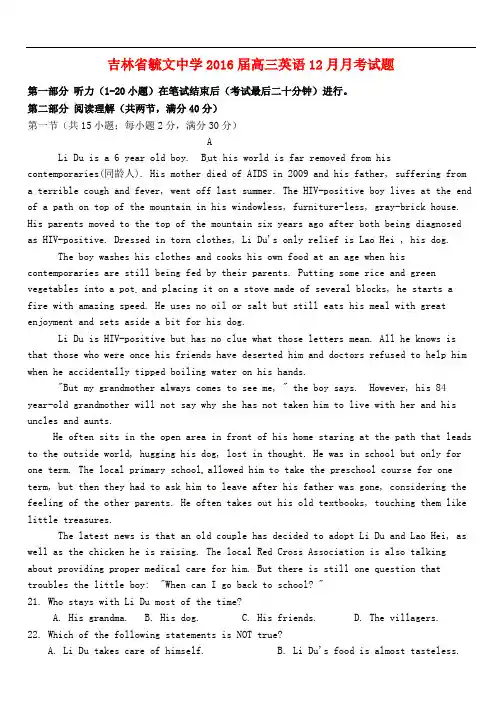
吉林省毓文中学2016届高三英语12月月考试题第一部分听力(1-20小题)在笔试结束后(考试最后二十分钟)进行。
第二部分阅读理解(共两节,满分40分)第一节(共15小题;每小题2分,满分30分)ALi Du is a 6 year old boy. But his world is far removed from hiscontemporaries(同龄人). His mother died of AIDS in 2009 and his father, suffering from a terrible cough and fever, went off last summer. The HIV-positive boy lives at the end of a path on top of the mountain in his windowless, furniture-less, gray-brick house. His parents moved to the top of the mountain six years ago after both being diagnosed as HIV-positive. Dressed in torn clothes, Li Du's only relief is Lao Hei , his dog.The boy washes his clothes and cooks his own food at an age when his contemporaries are still being fed by their parents. Putting some rice and green vegetables into a pot and placing it on a stove made of several blocks, he starts afire with amazing speed. He uses no oil or salt but still eats his meal with great enjoyment and sets aside a bit for his dog.Li Du is HIV-positive but has no clue what those letters mean. All he knows is that those who were once his friends have deserted him and doctors refused to help him when he accidentally tipped boiling water on his hands."But my grandmother always comes to see me, " the boy says. However, his 84year-old grandmother will not say why she has not taken him to live with her and his uncles and aunts.He often sits in the open area in front of his home staring at the path that leads to the outside world, hugging his dog, lost in thought. He was in school but only for one term. The local primary school allowed him to take the preschool course for one term, but then they had to ask him to leave after his father was gone, considering the feeling of the other parents. He often takes out his old textbooks, touching them like little treasures.The latest news is that an old couple has decided to adopt Li Du and Lao Hei, as well as the chicken he is raising. The local Red Cross Association is also talking about providing proper medical care for him. But there is still one question that troubles the little boy: "When can I go back to school? "21. Who stays with Li Du most of the time?A. His grandma.B. His dog.C. His friends.D. The villagers.22. Which of the following statements is NOT true?A. Li Du takes care of himself.B. Li Du's food is almost tasteless.C. Li Du has no idea what AIDS is.D. Nobody is willing to help the boy.23. What is the best title of the passage?A. A Boy And His BooksB. A Capable BoyC. A Boy Not To Be ForgottenD. A Boy Lacking Medical CareBRiding School:You can start horse—riding at any age.Choose private or group lessons any weekday between 9 a.m.and 8:30 P.m.(3:30 p.m.on Saturdays).There are 10 kilometers of tracks and paths for leisurely rides across farmland and open country.You will need a riding hat.Opening Hours:Monday through Friday:9:00 a.m.—8:30 p.m.Phone:(412)396—6754 Fax:(412)396—6752Sailing Club:Our Yo ung Sailor’s Course leads to the Stage 1 Sailing qualification.You’lllearn how to sail safely and the course also covers sailing theory and first aid.Have fun with other course members , afterwards in the clubroom.There are 10 weekly two-hour 1essons (Tuesdays 6 p.m.~8 p.m.).Opening Hours:Tuesdays:6:00 p.m.—8:00 p.m.Phone:(412)396—6644 Fax:(412)396—6644Diving Centre: Our experienced instructors offer one-month courses in deep-sea diving for beginners.There are two evening lessons a week,in which you learn to breathe underwater and use the equipment safely.You only need swimming costume and towel.Reduced rates for couples.Opening Hours:Monday and Friday:6:30 p.m.—8:30 p.m.Phone:(412)396—6312 Fax:(412)396—6706Medical Center:The staff of the Medical Center aim to provide convenient and comprehensive medical care to students and staff of the university.The center is well equipped and the staff here are trained to deal with a broad range of medical problems.Both female and male doctors as well as nursing staff are available for consultation.Also,all kinds of medicines are sold here and are cheaper for students than other drugstores.Opening Hours:24 hours from Monday to SundayPhone:(412)396--6649 Fax:(412)396—6648Watersports Club:We use a two-kilometer length of river for speedboat racing,and water-skiing,A beginners’course consists of ten 20-minute lessons.You will learn to handle boatssafely and confidently,but must be able to swim.The club is in a convenient central position and is open daily from 9 a.m to 4 p.m,with lessons all through the day.Opening Hours:Monday through Friday:9:00 a.m.—4:00 p.m.Phone: (412)396—6899 Fax396—689024.If you want to experience a new activity in the countryside in the mornings,you may fax _______ .A.(412)396—6648 B.(412)396—6752 C. (412)396—6876 D.(412)396—6706 25.If you are planning to explore the ocean depths.you should attend your lessons at______ .A. Monday through Friday:7:00 am-10:00 pm B. 24 hour from Monday to Sunday C.Tuesdays:6:00 pm-8:00pm D.Monday and Friday:6:30 pm -8:30pm26.You want to do an activity one evening a week and get a certificate in the end,you can go to ______.A. Diving Center B.Riding School C.Sailing Club D.Watersports Club27.Which is NOT the convenience that the Medical Center provides?A.Nursery for newly-born babies B.Well trained staff membersC.Good equipment. D.Various less expensive medicines.CAmericans use many expressions with the word dog. People in the United States love their dogs and treat them well. They take their dogs for walks, let them play outside and give them good food and medical care. However, dogs without owners to care for them lead a different kind of life. The expression, to lead a dog's life, describes a person who has an unhappy life.Some people say we live in a dog-eat-dog world. That means many people are competing for the same things, like good jobs. They say that to be successful, a person has to work like a dog. This means they have to work very, very hard. Such hard work can make people dog-tired. And, the situation would be even worse if they became sick as a dog.Still, people say every dog has its day. This means that every person enjoys a successful period during his or her life. To be successful, people often have to learn new skills. Yet, some people say that you can never teach an old dog new tricks. They believe that older people do not like to learn new things and will not change the way they do things.Some people are compared to dogs in bad ways. People who are unkind or uncaring can be described as meaner than a junkyard dog. Junkyard dogs live in places where people throw away things they do not want. But mean dogs are often used to guard this property.They bark or attack people who try to enter the property. However, sometimes a person who appears to be mean and threatening is really not so bad. We say his bark is worse than his bite.Dog expressions also are used to describe the weather. The dog days of summer are the hottest days of the year. A rainstorm may cool the weather. But we do not want itto rain too hard. We do not want it to rain cats and dogs.28. A person who lives an unhappy life can be described as “_______”.A. becoming sick as a dogB. leading a dog’s lifeC. living in a dog-eat-dog worldD. Working like a dog29.The underlined word “mean” in Paragraph 4 most probably means “_______”.A. wildB. selfishC. violentD. Poor30.What can we learn from the text?A. Everyone can be successful if he learns from the old.B. It might be difficult for the young to learn new skills.C. Junkyard dogs are careful in money arrangement.D. Fierce persons aren’t so awful as their appearance sometimes.31.To support his idea, the author develops the text mainly by _______.A. listing reasonsB. using idiomsC. giving examplesD. Making comparisonsDElectrical devices(仪器)could soon use power made by human energy. Scientists say they have developed an experimental device that produces electricity from the physical movement of a person walking , British scientist Max Donelan and other scientists in Canada and the United States developed the device.The device connects to a person’s knee. As the person walks ,the device captures energy each time the person slows down. To do this ,the device helps with the slowing down movement of the leg, the movements of the walking person push parts of a small machine that produces electricity. Using the device, an adult walking quickly could produce thirteen watts of electricity in just a minute. Donelan says walking at that speed could produce enough power to operate a laptop computer for six minutes.There are several possible uses for the device. Developers say it could help people who work in areas without electricity to operate small computers. The device could also he used in hospitals to operate heart pacemakers, it could even be used to assist in the movement of robotic arms and legs.The experimental version of the device weighs about one and a half kilograms, but it is too costly for most people to buy, but the researchers hope to make a lighter, less costly version, An improved version should be ready in one year.The developers hope the device will one day help developing countries; nearlytwenty five pe rcent of people around the world live without electric power.A similar product was invented in 2005 by Larry Rome of the University of Pennsylvania, He created a bag carried on a person’s back that also produces power from walking. The knee device does not produce as much electricity as the bag, but the bag requires the walker to carry a load of twenty to thirty kilograms.32. The second paragraph mainly talks aboutA. who developed the deviceB. how the device worksC. several possible uses for the devicesD. how much electricity the device can produce33. What is the disadvantage of the experimental version of the device?A. It is too heavy for the walker to bearB. It is too complex for people to useC. It is too expensive for most people to affordD. It will slow down one’s walking speed34. Compared with the device designed by Larry Rome, this new deviceA. produces power without adding more loads to the walkerB. can produce more power in a much shorter timeC. needs to be equipped with a batteryD. can help the walker walk faster35. What would be the best title for the passage?A. First device powered by walking will soon be on the marketB. Advanced technology brings in a new way to operate heart pacemakersC. Device gives new meaning to the idea of power walkingD Human energy will become a main source of electricity第二节(共5小题;每小题2分,满分10分)根据短文内容,从短文后的选项中选出能填入空白处的最佳选项。
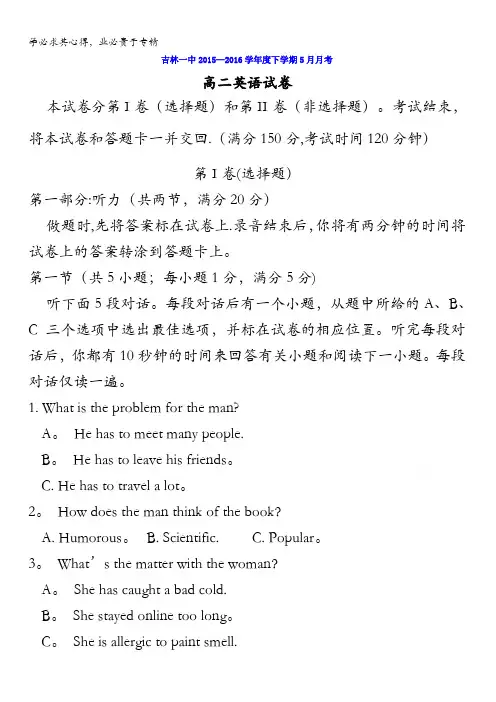
吉林一中2015—2016学年度下学期5月月考高二英语试卷本试卷分第I卷(选择题)和第II卷(非选择题)。
考试结束,将本试卷和答题卡一并交回.(满分150分,考试时间120分钟)第I卷(选择题)第一部分:听力(共两节,满分20分)做题时,先将答案标在试卷上.录音结束后,你将有两分钟的时间将试卷上的答案转涂到答题卡上。
第一节(共5小题;每小题1分,满分5分)听下面5段对话。
每段对话后有一个小题,从题中所给的A、B、C三个选项中选出最佳选项,并标在试卷的相应位置。
听完每段对话后,你都有10秒钟的时间来回答有关小题和阅读下一小题。
每段对话仅读一遍。
1. What is the problem for the man?A。
He has to meet many people.B。
He has to leave his friends。
C. He has to travel a lot。
2。
How does the man think of the book?A. Humorous。
B. Scientific.C. Popular。
3。
What’s the matter with the woman?A。
She has caught a bad cold.B。
She stayed online too long。
C。
She is allergic to paint smell.4。
What does the man suggest the woman do?A. Consult a repair shop。
B. Purchase another car. C。
Fix the car herself。
5。
In which year is the man in college now?A. The first year. B。
The second year。
C。
The third year。
第二节(共15小题;每小题1分,满分15分)听下面5段对话或独白.每段对话或独白后有几个小题,从题中所给的A、B、C三个选项中选出最佳选项,并标在试卷的相应位置。
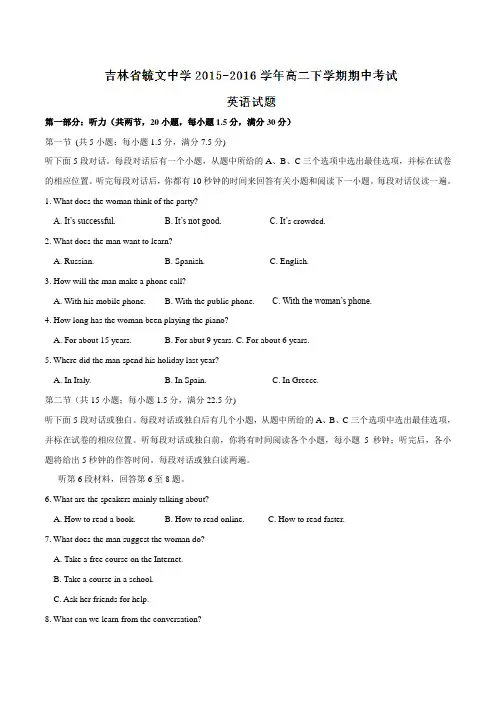
第一部分:听力(共两节,20小题,每小题1.5分,满分30分)第一节(共5小题;每小题1.5分,满分7.5分)听下面5段对话。
每段对话后有一个小题,从题中所给的A、B、C三个选项中选出最佳选项,并标在试卷的相应位置。
听完每段对话后,你都有10秒钟的时间来回答有关小题和阅读下一小题。
每段对话仅读一遍。
1. What does the woman think of the party?A. It’s successful.B. It’s not good.C. It’s crowded.2. What does the man want to learn?A. Russian.B. Spanish.C. English.3. How will the man make a phone call?A. With his mobile phone.B. With the public phone.C. With the woman’s phone.4. How long has the woman been playing the piano?A. For about 15 years.B. For abut 9 years.C. For about 6 years.5. Where did the man spend his holiday last year?A. In Italy.B. In Spain.C. In Greece.第二节(共15小题;每小题1.5分,满分22.5分)听下面5段对话或独白。
每段对话或独白后有几个小题,从题中所给的A、B、C三个选项中选出最佳选项,并标在试卷的相应位置。
听每段对话或独白前,你将有时间阅读各个小题,每小题5秒钟;听完后,各小题将给出5秒钟的作答时间。
每段对话或独白读两遍。
听第6段材料,回答第6至8题。
6. What are the speakers mainly talking about?A. How to read a book.B. How to read online.C. How to read faster.7. What does the man suggest the woman do?A. Take a free course on the Internet.B. Take a course in a school.C. Ask her friends for help.8. What can we learn from the conversation?A. The man hates reading online.B. The woman likes reading long novels.C. The man used to read like the woman.听第7段材料,回答第9至第11题。
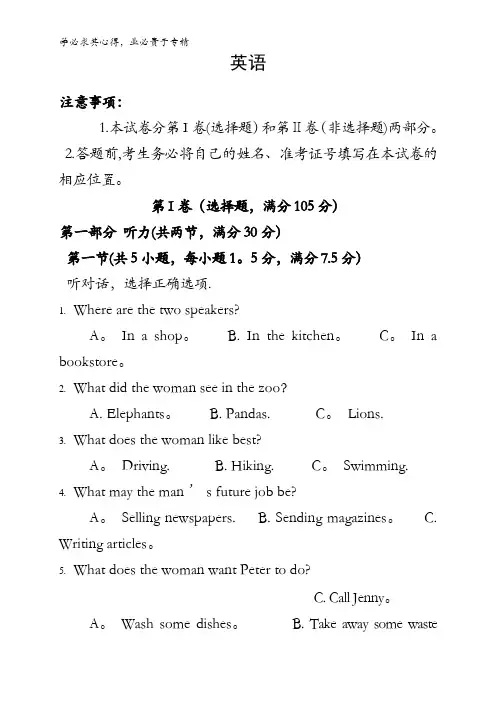
英语注意事项:1.本试卷分第I卷(选择题)和第Ⅱ卷(非选择题)两部分。
2.答题前,考生务必将自己的姓名、准考证号填写在本试卷的相应位置。
第I卷(选择题,满分105分)第一部分听力(共两节,满分30分)第一节(共5小题,每小题1。
5分,满分7.5分)听对话,选择正确选项.1.Where are the two speakers?A。
In a shop。
B. In the kitchen。
C。
In a bookstore。
2.What did the woman see in the zoo?A. Elephants。
B. Pandas. C。
Lions.3.What does the woman like best?A。
Driving. B. Hiking. C。
Swimming.4.What may the man ’ s future job be?A。
Selling newspapers. B. Sending magazines。
C. Writing articles。
5.What does the woman want Peter to do?C. Call Jenny。
A。
Wash some dishes。
B. Take away some wastethings.第二节(共15小题;每小题1.5分,满分22。
5分)听第6段材料, 回答第6至7题6。
How much is a hotel room a night in Harbin?A. About 420 yuan.B。
About 140 yuan。
C。
About 120 yuan.7. What season is it now?A. Winter。
B. Summer.C. Autumn.听第7段材料, 回答第8至9题8.Why did Tom and Julia quarrel with each other?A. Because Tom got a bad habit.B。
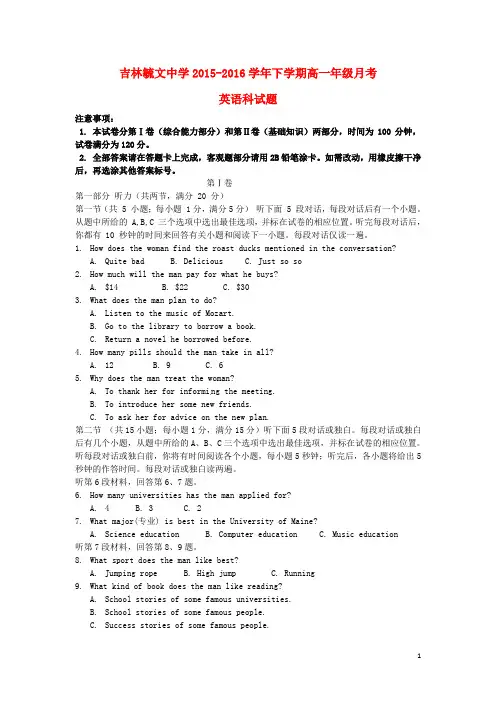
吉林毓文中学2015-2016学年下学期高一年级月考英语科试题注意事项:1. 本试卷分第Ⅰ卷(综合能力部分)和第Ⅱ卷(基础知识)两部分,时间为100分钟,试卷满分为120分。
2. 全部答案请在答题卡上完成,客观题部分请用2B铅笔涂卡。
如需改动,用橡皮擦干净后,再选涂其他答案标号。
第Ⅰ卷第一部分听力(共两节,满分 20 分)第一节(共 5 小题;每小题 1分,满分5分)听下面 5 段对话,每段对话后有一个小题。
从题中所给的 A,B,C 三个选项中选出最佳选项,并标在试卷的相应位置。
听完每段对话后,你都有 10 秒钟的时间来回答有关小题和阅读下一小题。
每段对话仅读一遍。
1.How does the woman find the roast ducks mentioned in the conversation?A.Quite badB. DeliciousC. Just so so2.How much will the man pay for what he buys?A.$14B. $22C. $303.What does the man plan to do?A.Listen to the music of Mozart.B.Go to the library to borrow a book.C.Return a novel he borrowed before.4.How many pills should the man take in all?A.12B. 9C. 65.Why does the man treat the woman?A.To thank her for informi ng the meeting.B.To introduce her some new friends.C.To ask her for advice on the new plan.第二节(共15小题;每小题1分,满分15分)听下面5段对话或独白。
吉林高二高中英语月考试卷班级:___________ 姓名:___________ 分数:___________一、单项选择1.II. 单项选择(15分)21. —Hello, Jane. I come to say goodbye to you. I’ll start a new job in another company. —_______.A.Oh, no problem B.Oh, enjoy yourself C.Oh, all the best D.Oh, have a happy day 2.22. --- Do you have anything to_____?--- No, you can have a rest.A.type B.to be typed C.typing D.typed3.23. _______ his disability, he did it very well. Please don’t scold him.A.Considering B.Considered C.To consider D.Being considered4.24. What way are you thinking of ___ rid of this kind of pollution?A.to get B.get C.getting D.Got5.25.Finnish President said Finland-China relations had progressed ___ with fruitful cooperation in new and high-tech fields.A.peacefully B.highly C.quietly D.smoothly6.26. _____ about what he had done, the shy boy ran away as fast as possible.A.Having embarrassed B.Embarrassing C.To embarrass D.Embarrassed7.27. The new teacher was very quick to _________ the rules of the schoolA.adapt to B.addict to C.concentrate on D.depend on8.28. The hearings and comments often help managers avoid harmful decisions, leading them toward more_______ choices.A.useful B.beneficial C.important D.influential9.29. Both the soldier and the horse ______ after the long ride.A.gave out B.worn out C.tested out D.ran out10.30. Yesterday evening I came across the man _____ you think is pleased to _____.A.who, talk B.whom, get along with C.who, work with D.whom, be talked with 11.31. I just wonder ____ that delights the whole family so much.A.what it is B.what he does C.how it is D.how he does12.32. This disaster ______ that people had no knowledge of first ai d and they hadn’t known how to protectthem-selves in face of danger.A.led to B.contributed to C.resulted in D.lay in13.33. To improve your reading ability, you should ____ half an hour every day for learning new vocabulary. A.leave out B.take up C.set aside D.focus on14.34. The man showed us so heavy a stone _______ no man can lift.A.that B.as C.which D.And15.35. —Did you attend David’s wedding last night?—No. I ________ before that.A.wouldn’t have been invited B.didn’t inviteC.wouldn’t invite D.hadn’t been invited二、完形填空III. 完形填空(20分)An eight-year-old child heard her parents talking about her little brother. All she knew was that he was very sick and they had no money left. When she heard her daddy say to her 36 mother with whispered desperation(绝望), “ 37 a miracle(奇迹)can save him now”, the little girl went to her bedroom and took out her piggy bank. She 38 all the change out on the floor and counted it carefully. Then she 39 her way six blocks to the local drugstore(药店).“And what do you want?” asked the chemist.“It’s 40 my little brother,”the girl answered back. “He’s really, really sick and I want to buy a 41 . His name is Andrew and he has something 42 growing inside his head and my daddy says only a miracle can save him.”“We don’t 43 miracles here, child I’m sorry,” the chemist said, smiling 44 at the little girl.In the shop was a 45 customer. He stooped (弯腰) down and asked the little girl, “What kind of miracle does your brother 46 ?”“I don’t know,” she replied “He’s really sick and mommy says he needs 47 . But my daddy can’t pay for it, so I have brought my 48 .”“How much do you have?” asked the man.“One dollar and eleven cents, 49 I can try and get some more,” she answered quietly.“Well, what a coincidence(巧合),” smiled the man. “A dollar and eleven cents — the 50 price of a miracle for little brothers. 51 me to where you live. I want to see your brother and 52 your parents.”That well dressed man was Dr Carlton Armstrong, a surgeon(外科医生). The operation was completed without 53 and it wasn’t long before Andrew was 54 again and doing well.The little girl was happy. She knew exactly how much the miracle cost ... one dollar and eleven cents ... plusthe 55 of a little child.36.A.tearful B.hopeful C.helpless D.kind37.A.Simply B.Just C.Only D.More than38.A.drew B.pulled C.put D.poured39.A.followed B.made C.took D.found40.A.to B.as C.for D.on41.A.hope B.doctor C.favor D.miracle42.A.bad B.small C.extra D.impossible43.A.have B.offer C.sell D.store44.A.gently B.sadly C.strangely D.coldly45.A.well dressed B.kind hearted C.well behaved D.good looking46.A.have B.need C.care D.like47.A.a doctor B.a surgeon C.an operation D.a kindness48.A.savings B.wishes C.ideas D.suggestions49.A.since B.as C.after D.but50.A.same B.exact C.proper D.necessary51.A.Show B.Help C.Take D.Follow52.A.help B.encourage C.persuade D.meet53.A.difficulty B.delay C.charge D.result54.A.happy B.well C.strong D.home55. A.cleverness B.faith C.courage D.Devotion三、阅读理解1.Ⅳ阅读理解(共两节,满分40分)第一节(共15小题;每小题2分,满分30分)AThe Internet has led to a huge increase in credit-card fraud.Your card information could even be for sale in an illegal Website. Websites offering cheap goods and services should be regarded with card.On line, shoppers who enter their credit-card information may never receive the goods they thought they bought.The thieves then go shopping with your card number — or sell the information over the Internet. Computer hackers have broken down security system, raise questions about the safety of card-holder information.Several months ago, 25,000 customers of CD universe, an on-line music retailer (零售商), were not lucky. Their names, addresses and credit-card numbers were posted on a Website after the retailer refused to pay US $157,828 to get back the information.Credit-card firms are now fighting against on-line fraud.Master-card is working on plans for Web-only credit-card, with a lower credit limit. The card could be used only for shopping on-line. However, there are a few simple steps you can take to keep from being cheated.Ask about your credit-card firm’s on-line rules: Under British law, cardholders are responsible for the first US $78 of any fraudulent spending.And shop only at secure sites: Send your credit-card information only if the Website offers advanced secure system.If the security is in place, a letter will appear in the bottom right-hand corner of your screen. The Website address may also start the extra “s” stands for secu re. If in doubt, give your credit-card information over the telephone. Keep your password safe: Most on-line sites require a user name and password before placing an order. Treat your password with care.56.The underlined word “fraud” in the first paragrap h probably means _____.A.cheating B.sale C.payment D.use57.Thieves usually get the information of the credit-card _____.A.because many customers lost their cardsB.by paying money for people working in the information companiesC.because of the carelessness of the customersD.by stealing the information from Websites58.The best title for the passage might be _____.A.How to Beat On-line Credit-card ThievesB.How to Shop on the InternetC.Never Use Credit Cards without an Advanced ComputerD.Why Thieves Steal Credit-Card Information2. BThis is a dangerous world we live in. The number of murders goes up every year, people are dying of cancer, more people contract HIV, more teens are using drugs, etc. You know this because you have heard all the statistics on the news and in the paper. But do you really have an accurate idea what they mean? The numbers are growing up, but how do they compare to the growth in population? Are more cases of these diseases being reported because of better testing techniques, or are the diseases more common? The fact is that without knowing the background statistics mean very little.This growing trend of reporting only part of the information is becoming dangerous. For example, several years ago a high school student reported the dangers of the chemical known as dihydrogen monoxide. This chemical, found in most cancerous tumors(肿瘤), is often found in the blood of people drunk on alcohol, and causes complete physical and mental dependence for those who take the chemical even once. After reading his report, more than 75% of his Advanced Placement Chemistry class voted to forbid this dangerous chemical! Every one of the above statements is true, yet this chemical is necessary to all life on earth. The students made the mistake be cause they voted knowing only a few statements and statistics, rather than the chemical’s full background. The point of this article is that one should be aware of what is and is not being said. When one finds a new fact or number, one should try to consider other important information before forming an opinion with only half-truths. Always remember that the author is trying to convince you of his or her own view, and will leave out information that is different to his view. For example, look again at the statistics that suggest skiing is safe. Only 32 people may die each year when skiing, while 897 die from lightning strikes, but which is really the most dangerous? If you think about it, you realize far fewer people go skiing each year than the number of people who are in danger of a lightning strike. When you think about it, skiing is more dangerous than you might at first think when looking at statistics. If we teenagers are to be left in this world, we had better be able to think critically, and form our own views, rather than be easily persuaded by another’s. To be warned is to be prepared.59. In the first paragraph, what problem does the writer want to warn us?A. We are now living in a dangerous world.B. We get a lot of false statistics from the media.C. Statistics alone without full background doesn’t give us an accurate pictures of things.D. There are around us more and more murders, diseases, etc.60. Why does the writer use the example in the second paragraph?A. To argue that high school students are easily persuaded.B. To show the danger of reporting only part of the information.C. To prove what is necessary to us might be dangerous.D. To warn us of the harmful substance around us.61. Relative information is often left out because__________.A. Relative information is not that important.B. too much information will make readers feel confused.C. the author is trying to show what he or she says is true.D. readers are not able to analyze so much information at once.62. What can we learn from the passage?A. We should learn to think critically and look at problems from all sides.B. Some measures must be taken to protect our dangerous world.C. The growing trend of reporting only half-truths is getting out of control.D. Teenagers ought to improve their ability of telling right from wrong.3.CReading about history is nice, but finding ties to long-ago historical events in your own backyard is really exciting. In their heavily populated area, neighbors Adam Giles,13, and Derek Hann.12, uncovered pieces of glass that looked quite different from what’s used today. “After digging about two feet down, I came across an interesting bottle,” Derek said. The bottle had a “pontil scar” on the bottle, an indication that it was hand-blown rather than machine made. It also had the name “Fraser” on one side.Adam found remains of a green bottle and some very thick brown glass—again, far different from today’s.After doing research on the computer, the boys contacted Aimee Well s of the county’s Cultural Resources office. She showed them a computer program that digitally puts old maps over modern satellite photographs.Bingo! Their back yards were once part of a military(军事的) encampment(营地) called Camp Alger usedby Ohio soldiers on their way to fight in the Spanish-American War in 1898.So how do a few bottles get connected to a brief war that was more than a century ago? “We get there by good judgment,” Wells said. “We know the time period of the bottles and what happened in that area.” Anyone can dig a hole, but archaeologists seek a deeper understanding. How do objects found relate to things around them? When Derek and Adam realized that a solider might have held that Fraser bottle 110 years ago, they wondered what he might have been thinking. What did he see as he looked around him? How did he pass the time waiting to go into battle?Historical records show that while waiting for orders, the soldiers in and around Camp Alger played baseball, played instruments and walked seven miles to the Potomac River once a week for baths. A spread of strange fever forced the closing of the camp, and there are no buildings to study. “What’s left is only what’s in the ground,” said Wells.Derek’s and Adam’s back yards have joined the 3,400 places listed on the county’s register of archaeological sites. The boys were given tips on how to dig effectively and safely, and on how to document the location of items found.The official record of their finds serves as another piece of the puzzle for historians seeking to form a more complete story of what happened.“Not everyone is going to have historical objects in their own yard,” Wells said. “That’s okay. Make your own time capsule and bury it. What would you want people to know about your life years from now?”63. What is the passage mainly about?A. How Adam Giles and Derek Hann dug out the remains of an ancient military encampment.B. What Adam Giles and Derek Hann found in their back yard and its relationship with an encampment.C. The great contribution Adam Giles and Derek Hann made to the cause of archaeology.D. The tips on how to dig out ancient objects buried under the ground safely and effectively.64. From the passage, we can see that the boy’s discovery _______.A. includes all kinds of hand-made and machine- made glass.B. has helped historians find out what happened in 1898.C. couldn’t have been meaningful without Aimee Wells’ help.D. has added the county to the list of archaeologist sites.65. When Wells said “We get there by good judgment.” (Paragraph 6), she meant that_______.A. they have established the ties to Camp Alger by finding out the time period of the bottles.B. they have figured out how to get to the place where the brief war happened.C. they have managed to dig out the bottles in the back yard safely with common sense.D. they were able to locate the soldiers who used the Fraser bottles 110 years ago.66. Which of the following fits the description of historical records?A. The soldiers in and around Camp Alger delighted in playing basketball in their spare time.B. When Camp Alger was forced to close, all the buildings there were destroyed.C. The soldiers in and around Camp Alger often buried some bottles underground as time capsules.D. Camp Alger was forced to close because of a spread of a strange fever.4.DFOREIGN EXCHANGEA CLASS OF THEIR OWNA.Susan Lane and Sara Small B.Linda Marks and David LinksC.Tom Jennings and Linda Marks D.Leanne Smythe and Tom Jennings68.The writing above would probably be ______.A.the records of students’ activitiesB.the foreign students’ name cardsC.the notice about a visit to foreign countriesD.the advertisement from an international travel service69.The student who values learning another language is ______.A.Linda Marks B.Sara Small C.Tom Jennings D.Leanne Smythe70.How many students mention the culture difference they have experienced ?A. Three . B.Four . C.Five . D.Six .四、其他第二节(共5小题,每小题2分,满分10分)根据短文内容,从短文后的选项中选出能填入空白处的最佳选项。
吉林省吉林市2016-2017学年高二英语3月月考试题第I卷说明:1、本试卷分第I卷(选择题)和第II卷(非选择题)二、满分140分,考试时刻100分钟I:听力(共两节,满分20分)第一节(共5小题:每题1分,满分5分)听下面5段对话,每段对话后有一小题,每段对话只读一遍。
1. What is the man’s problem?A. He didn’t listen carefully to the teacher.B. He didn’t know the football match.C. He was thinking of his homework..2. Where does the conversation most probably take place?A. At school.B. In a hospital.C. At a post office.3. What does the man ask the woman to do?A. Go to the party.B. Invite Porter to the party.C. Give his regards to Porter’s family.4. What does Jane do?A. She is a worker.B. She is a professor.C. She is a driver.5. What are the two speakers going to do this afternoon?A. Go to Peking University.B. Give a lecture.C. Listen to the talk.第二节(共15小题:每题1分,满分15分)每段对话读两遍.听第6段材料,回答6至7题6. What is the man doing?A. Booking a single room for a night.B. Booking a double room for a week.C. Asking where the hotel is7. Which room does the man book?A. Room 401.B. Room 411.C. Room 441.听第7段材料,回答第8至98. What’s the weather like today?A. It is rainy.B. It is cloudy.C. It is sunny.9. What does the woman wish?A. Her friends could come to the party.B. The weather could turn out fine soon.C. The TV program could be interesting.听第8段材料,回答第10至12题10. How many clocks does Peter have?A. Two.B. Three.C. Four.11. How often do the clocks ring in the morning?A. Every ten minutes.B. Every twenty minutes.C. Every thirty minutes.12. Why does Peter need so many clocks?A. Because he wants to get up on time.B. Because he wants to know the right time.C. Because he wants to make his room special.听第9段材料,回答第13至16题。
考生在答题前请认真阅读本注意事项及各题答题要求:1.本试卷分第I卷、第II卷和答题卡,试题共6页。
满分120分,考试用时100分钟。
考试结束后,请将答题卡卷交回,试题卷自己保存。
2.答题前,请您务必将自己的班级、姓名、学号、考号用0.5毫米黑色签字笔填写在答题卡上。
3.请用0.5毫米的黑色签字笔将答案写在答题卡上的指定位置,在其它位置作答一律无效。
4.保持答题卷清洁、完整,严禁使用涂改液和修正带。
第I卷选择题(共60分)第一部分:完形填空(共20小题;每小题1.5分,共30分)阅读下面短文,从短文后各题所给的四个选项(A、B、C和D)中,选出可以填入空白处的最佳选项,并在答题卡上将该项涂黑。
John Brown, 52, is an experienced police officer. Much of his work involves dealing with 1 an gang(团伙)problems in the schools of his community. Knowing that many kids often 2 trouble, he decided to do something about it. So in 1991 he began to invite small groups of kids to go fishing with him on his day 3 .Those fun trips had a(n) 4 impact. A chance encounter in 2000 proved that. One day, 5 working security at a school basketball game, John noticed two young guys 6 .He sensed trouble between them. 7 one of them headed toward John and gave him a hug. “I8 you.You took me 9 when I was in fifth grade. That was one of the 10 days of my life.”Deeply touched by the boy's word, John decided to create a foundation(基金会)that 11 teenagers to the basics of fishing in camping programs.“As a policeman, I saw 12 there was violence, drugs were always behind it. They have a damaging 13 on the kids,” says John.By turning kids on to fishing, he 14 to present an alternative way of life, “When you're sitting there waiting for a15 ,”he says,“you can't help but talk to each other, and such 16 can be pretty deep.”“Talking about drugs helped prepare me for the peer(同龄人)pressures in high school, ”says Michelle, 17 who17 the first program. “And I was able to help my little brother 18 drugs.”John faces 19in three years, when he hopes to run the foundation full-time. “I'm living a happy life and I have a responsibility to my20 to give back,”John says. “ If I teach a kid to fish today, he can teach his brother to fish tomorrow.”1. A. drugs B.drinking C. securityD. smoking2. A. left behind B. got over C. ran into D. looked into3. A. ahead B.away C.off D. out4. A. immediate B. damagingC. limitedD. lasting5. A. onceB. sinceC.while D. until6. A. quarreling B. complainingC. talkingD. cheering7. A. Slowly B.Suddenly C. FinallyD. Secretly8. A. understand B.hear C.see D. remember9. A. swimming B.sailing C.boating D. fishing10. A. quietest B.longest C.best D. busiest11. A. connects B. introducesC. reducesD. commits12. A. where B.unless C.as D. whether13. A. impression B.burden C.decision D. impact14. A. asked B.intended C. pretended D. agreed15. A. solution B.change C.bite D. surprise16. A. concerns B.interests C. conversations D. emotions17. A. participated in B. worked outC. approved ofD. made up18. A. misuseB. testC.tolerate D. avoid19. A. unemployment B. challengeC. retirementD. competition20. A. team B.school C.family D. community第二部分阅读理解(共15小题;每小题2分,共30分)第一节(共10小题;每小题2分,满分20分)阅读下列短文,从每题所给的四个选项(A、B、C和D)中,选出最佳选项,并在答题卡上将该项涂黑。
吉林省长春市2016-2017学年高二英语下学期第一次月考试卷考生在答题前请认真阅读本须知事项与各题答题要求:1.本试卷分第1卷、第2卷和答题卡,共6页。
总分为 150 分。
考试完毕后,请将答题卡卷交回,试题卷自己保存。
2.答题前,请您务必将自己的班级、姓名、学号、考号用0.5毫米黑色签字笔填写在答题卡上。
3.请用0.5毫米的黑色签字笔将答案写在答题卡上的指定位置,在其它位置作答一律无效。
4.保持答题卷清洁、完整,严禁使用涂改液和修正带。
第1卷选择题〔共 90 分〕第一局部:听力〔共20题,总分为 20 分〕第一节〔共5小题;每一小题1分,总分为5分〕听下面5段对话。
每段对话后有一个小题,从题中所给的A、B、C三个选项中选出最优选项,并标在试卷的相应位置。
听完每段对话后,你都有10秒钟的时间来回答有关小题和阅读下一小题。
每段对话仅读一遍。
1. Who spoke to Jane?A. Her husband.B. Her boss.C. Her teacher.2. How does the woman go shopping now?A. By car.B. By bike.C. On foot.3. What did the man do last night?A. He lost a game.B. He watched a game.C. He missed a game.4. Why’s the woman worried?A. Jessica may be late for the opening speech.B. Jessica won’t come to the conference.C. Jessica will miss the next conference.5. Where is the woman?A. At a cinema.B. At the airport.C. In a shopping center.第二节〔共15小题;每一小题1分,总分为15分〕听下面5段对话或独白。
吉林毓文中学2015-2016学年度下学期第一次月考高二英语试题第一部分:听力(共两节,20小题,每小题1.5分,满分30分)第一节 (共5小题;每小题1.5分,满分7.5分)听下面5段对话。
每段对话后有一个小题,从题中所给的A、B、C三个选项中选出最佳选项,并标在试卷的相应位置。
听完每段对话后,你都有10秒钟的时间来回答有关小题和阅读下一小题。
每段对话仅读一遍。
1. What does the woman think makes people happy?A. Money.B. Love.C. Success.2. What are the speakers talking about?A. A television.B. A picture.C. A movie.3. Where did the woman meet Alice?A. At a restaurant.B. At a school.C. At a clothes shop.4. Who is the woman?A. A house owner.B. A house agent.C. A house keeper.5. How long can the man keep the book?A. For one week.B. For two weeks.C. For three weeks.第二节(共15小题;每小题1.5分,满分22.5分)听下面5段对话或独白,每段对话或独白后有几个小题,从题中所给的A、B、C三个选项中选出最佳选项,并标在试卷的相应位置。
听每段对话或独白前,你将有时间阅读各个小题,每小题5秒钟;听完后,各小题将给出5秒钟的作答时间。
每段对话或独白读两遍。
听第6段材料, 回答第6、7题。
6. Where does the woman work?A. In a newspaper office.B. In a sports shop.C. In a sports club.7. What kind of water sports does the man often do?A. Sailing.B. Windsurfing.C. Swimming.听第7段材料, 回答第8至10题。
吉林毓文中学2015~2016学年度上学期期中考试高二英语试题Ⅰ 客观卷第一部分:听力(共两节,每小题1.5分, 满分30分)第一节(共5小题,每小题1.5分,满分7.5分)听下面5段对话。
每段对话后有一个小题,从题中所给的A、B、C三个选项中选出最佳答案。
每段对话仅读一遍。
1.What will the man probably do?A. Attend the concert after his exams are finished.B. Stay home to prepare for his exams.C. Go to the concert with the woman.2. What is the weather like now?A. Windy.B. Hot.C. Foggy.3. What does the man mean?A. They should decide by Friday.B. They’d better decide right now.C. They have another week to decide.4. How much should the man pay?A. $ 300.B. $ 260.C. $ 120.5. Where is the TV guide?A. On top of the television.B. By the telephone.C. Under the sofa. 第二节(共15小题,每小题1.5分,满分22.5分)听下面5段对话或独白,每段对话或独白后有几个小题,从题中所给的A,B,C三个选项中选出最佳选项,并标在试卷的相应位置。
听每段对话或独白前,你将有5秒钟的时间阅读各个小题;听完后,各小题将给出5秒钟的作答时间。
每段对话或独白读两遍。
听下面一段对话,回答第6~7 题。
6. What can be inferred about the speakers?A. They are opening 500 new stores.B. They work for a coffee company.C. Their business is not going well.7. What does the woman say about House of Coffee?A. It is growing rapidly.B. It has the best drinks.C. Its bus iness is shrinking.听下面一段对话,回答第8~10 题。
吉林毓文中学2015-2016学年度下学期第一次月考高二英语试题第一部分:听力(共两节,20小题,每小题1.5分,满分30分)第一节(共5小题;每小题1.5分,满分7.5分)听下面5段对话。
每段对话后有一个小题,从题中所给的A、B、C三个选项中选出最佳选项,并标在试卷的相应位置。
听完每段对话后,你都有10秒钟的时间来回答有关小题和阅读下一小题。
每段对话仅读一遍。
1. What does the woman think makes people happy?A. Money.B. Love.C. Success.2. What are the speakers talking about?A. A television.B. A picture.C. A movie.3. Where did the woman meet Alice?A. At a restaurant.B. At a school.C. At a clothes shop.4. Who is the woman?A. A house owner.B. A house agent.C. A house keeper.5. How long can the man keep the book?A. For one week.B. For two weeks.C. For three weeks.第二节(共15小题;每小题1.5分,满分22.5分)听下面5段对话或独白,每段对话或独白后有几个小题,从题中所给的A、B、C三个选项中选出最佳选项,并标在试卷的相应位置。
听每段对话或独白前,你将有时间阅读各个小题,每小题5秒钟;听完后,各小题将给出5秒钟的作答时间。
每段对话或独白读两遍。
听第6段材料, 回答第6、7题。
6. Where does the woman work?A. In a newspaper office.B. In a sports shop.C. In a sports club.7. What kind of water sports does the man often do?A. Sailing.B. Windsurfing.C. Swimming.听第7段材料, 回答第8至10题。
8. Where are the speakers?A. In a hotel.B. In a bank.C. In a clothes shop.9. What does the man want to do?A. Have a drink.B. Buy a T-shirt.C. Get some money.10. What can we learn from the conversation?A. The speakers are in Avenue de Suéde.B. The man should turn right twice.C. The café is next to the bank.听第8段材料, 回答第11至13题。
11. Why is the man happy?A. He was promoted.B. He was praised by his boss.C. He found a new job.12. What advice did the man give his boss?A. Add more signing-in stations.B. Call off the signing-in system.C. Introduce a new signing-in system.13. What does the woman suggest the man do?A. Ask for an award.B. Talk with his colleagues.C. Behave himself in the company.听第9段材料, 回答第14至17题。
14. What are the speakers mainly talk about?A. A mobile phone.B. An MP3 player.C. A computer.15. What is the relationship between the speakers?A. Customer and saleswoman.B. Husband and wife.C. Interviewer and interviewee.16. What is one of the features of the product?A. It can give directions.B. It can deliver files anywhere.C. It can be used as an address book.17. What does the man like about the product?A. The style.B. The price.C. The functions.听第10段材料, 回答第18至20题。
18. What part-time job did the speaker do when she was in high school?A. She was a babysitter.B. She was a waitress.C. She was a store detective.19. What do we know about the speaker?A. She saved no money from the summer job.B. She found her summer job exciting.C. she still likes shopping now.20. Why did the speaker fail to catch the thieves?A. She couldn’t see clearly.B. She was afraid to do that.C. She was too young to do that.第二部分:单项选择(共20小题;每小题0.5分,满分10分)21._______is known to us all is that the Chinese government has spared no efforts to protect people from fake food.A.What B.It C.As D.Which22.The designer asked ________ we were getting on well with the project.A.how B.what C.if D.that23.What we can learn from the story is _______ you mustn't blame children for the mistakes of their parents.A.where B.what C.whether D.that24.It made Kate's parents excited _______ Kate entered the final in the tennis match.A.what B.whether C.that D.when25. They were walking along the shore ______ a huge wave appeared out of nowhere, sweepingthem out to sea.A. asB. whileC. whenD. though26. It was his courage, not his skill, ______ really struck me most.A. whenB. whereC. whichD. that27. The two things ______ the couple felt most proud were their small garden and their sports car.A. about whichB. of whichC. for whichD. in which28. _______ him that she would fail as she was so able and worked so hard.A.It never occurred to B.That never occurred toC.It never occurred with D.That never occurred for29. I have to go to school by bus because my bicycle _____.A. will be repairedB. is repairedC. has been repairedD. is being repaired30. Many experts stick to the view _____ teacher development is _____ the key to qualityeducation lies.A. which; whereB. which; in whichC. that; whereD. that; in which31.The decision has been made ________a new school building be built next month.A. whyB. ifC. whetherD. that32. _____ the teacher expected, the students were very excited after heard the good news.A. AsB. SoC. WhatD. /33. TV-turn-off week,________millions of people around the world participate every year,triesto encourage people to turn on life.A. in whichB. on whichC. whichD. when34. Do you remember the chicken farm _____ we visited three months ago?A. whereB. whenC. thatD. what35. To show our respect, we usually have to take our gloves off ________ we are to shake handswith.A. whicheverB. wheneverC. whoeverD. whatever36. Our teacher did all _____ he could to help them.A. whatB. whichC. thatD. whose37. He is such a good teacher _____ we all like him.A. whomB. thatC. asD. which38. Occasions are quite rare ______ I have the time to spend a day with my kids.A. whenB. whichC. whyD. where39. The old temple _______ roof was damaged in storm is now under repair.A. whereB. whichC. itsD. whose40. _________ we can’t get seems better than __________ we have.A. What, whatB. What, thatC. That, thatD. That, what第三部分:阅读理解(共两节,满分40分)第一节阅读下列短文,从每题所给的四个选项中,选出最佳选项。